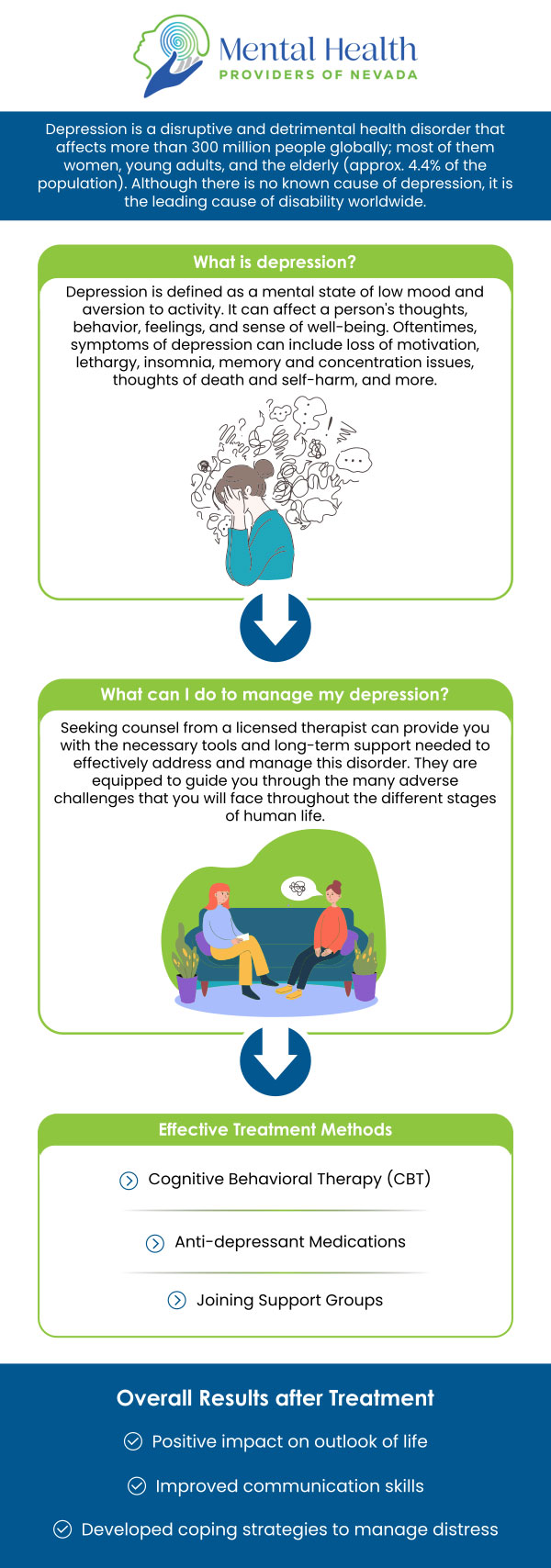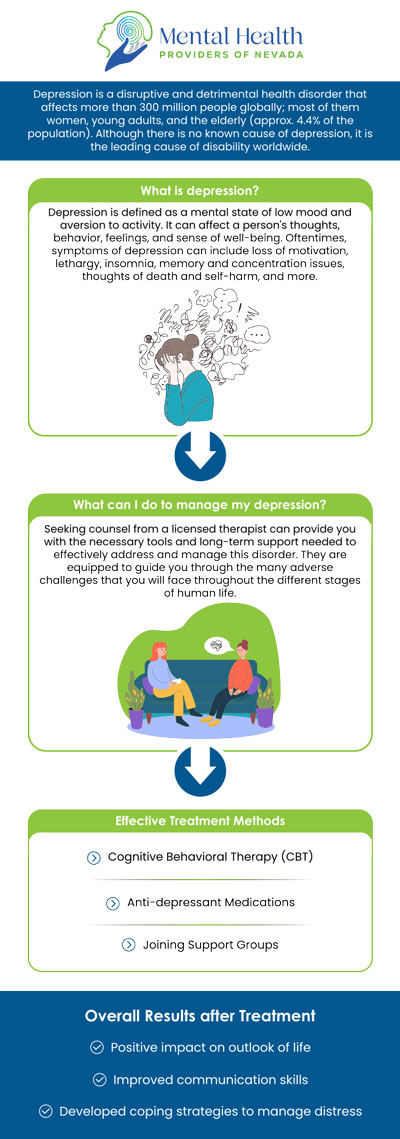Depression: Causes, Symptoms, and Types
Depression is a mental health condition with various causes, including genetic, biological, and environmental factors. Symptoms often include sadness, fatigue, changes in sleep and appetite, and difficulty concentrating. At Mental Health Providers of Nevada, Deborah, NP, PhD offers tailored treatments, such as therapy and medication, to address symptoms and improve overall well-being. For more information, contact us or request an appointment online. We are conveniently located at 2620 Regatta Drive, Suite 246A, Las Vegas, NV 89128.


Table of Contents:
How do genetic factors influence depression?
What are the different types of depression?
How does depression affect daily life and functioning?
Can depression be triggered by external life events?
Genetic predispositions play a significant role in determining an individual’s vulnerability to depression, which is why our practice emphasizes personalized mental health care tailored to each patient’s unique genetic and environmental background.
Research has consistently demonstrated that depression often runs in families. Individuals with close relatives who have experienced depression are at a higher risk themselves, highlighting the hereditary component of this condition. By identifying genetic risk factors early, we can provide proactive care and preventive strategies to help manage mental health effectively.
Scientists have discovered multiple genes associated with depression, although no individual gene is solely responsible. Instead, depression typically results from a complex interplay among multiple genes, each contributing to the overall risk. Genetic variations can affect an individual’s emotional resilience, stress response, and neurotransmitter function, specifically serotonin, dopamine, and norepinephrine all of which are essential in mood regulation and emotional stability.
These genetic factors also influence brain structure and function, particularly in areas critical for emotional processing, such as the prefrontal cortex, hippocampus, and amygdala. Variations in genes associated with these brain regions can alter neural pathways and predispose individuals to depression. At Mental Health Providers of Nevada, we utilize evidence-based approaches that consider how these biological factors can influence mental health, enabling us to develop personalized treatment plans.
Depression encompasses several distinct types, each with unique symptoms, durations, and circumstances surrounding their onset. Our experienced clinicians are equipped to diagnose and treat various forms of depression, providing personalized care tailored to each individual’s needs.
Major Depressive Disorder (MDD)
MDD, or clinical depression, is marked by persistent sadness, fatigue, loss of interest, and changes in appetite or sleep patterns. It lasts for at least two weeks. At Mental Health Providers of Nevada, we offer comprehensive evaluations and personalized treatment plans.
Persistent Depressive Disorder (Dysthymia)
This form of depression is chronic but milder, lasting at least two years in adults or one year in children. Our experts provide long-term support and therapeutic interventions to help manage symptoms and improve functioning.
Bipolar Disorder
Bipolar disorder involves alternating periods of depression and elevated or irritable moods (mania or hypomania). Our providers specialize in mood stability, offering medication management and psychotherapy.
Seasonal Affective Disorder (SAD)
SAD typically occurs in fall and winter, causing fatigue, increased sleepiness, cravings, weight gain, and social withdrawal. We offer treatments, including psychotherapy, medication, and lifestyle changes, to manage seasonal symptoms.
Postpartum Depression
This depression occurs after childbirth, affecting mood and family relationships. We provide compassionate care to new mothers, addressing mood swings, anxiety, and feelings of guilt, helping them regain emotional well-being and healthy connections with their baby.
Psychotic Depression
A severe form of depression with hallucinations or delusions, psychotic depression requires careful evaluation and integrated treatments, including medication and therapy, to support recovery.
Situational Depression (Adjustment Disorder)
Situational depression arises from life stressors like loss, divorce, or illness. Our therapists offer targeted psychotherapy and interventions to help you cope with and adapt to significant changes.
Recognizing and understanding the different types of depression is essential, as treatment approaches can significantly differ based on each individual’s diagnosis, life circumstances, and severity of symptoms. Our dedicated team of licensed mental health professionals provides comprehensive assessments, personalized psychotherapy, medication management, lifestyle modification strategies, and ongoing support to help you or your loved ones manage depression effectively and regain wellness.
Depression impacts emotional well-being, cognitive functioning, physical health, and personal relationships. Individuals often experience persistent sadness, hopelessness, and a loss of interest in activities they once enjoyed, leading to withdrawal from social interactions and daily responsibilities. Cognitive effects include impaired concentration, memory, decision-making, and mental clarity, making routine tasks overwhelming and reducing productivity at work or school.
Physically, depression can cause changes in appetite, sleep disturbances, fatigue, and low energy levels. It may lead to either weight loss or weight gain, and sleep issues such as insomnia or excessive sleeping can further disrupt daily routines. Depression can also cause physical symptoms like headaches, body aches, and gastrointestinal problems, contributing to overall discomfort.
Socially, depression strains relationships, causing individuals to become withdrawn, irritable, or emotionally distant, leading to increased isolation and loneliness. This lack of social connection can worsen symptoms, lower self-esteem, and cause individuals to avoid interactions due to feelings of shame or fear of judgement.
At Mental Health Providers of Nevada, we recognize how depression affects daily life. Our compassionate clinicians offer personalized, evidence-based treatments that address the emotional, cognitive, physical, and social challenges of depression. Early intervention is crucial to reducing the severity of depressive episodes and helping individuals regain control, improve their quality of life, and restore their overall well-being.
External life events can significantly impact emotional well-being and act as powerful triggers for depression. Situations commonly encountered by individuals in Nevada such as losing a loved one, experiencing relationship difficulties, unemployment, financial hardships, or dealing with chronic illness, can profoundly affect mental health and potentially lead to depressive episodes.
Major stressful life events often challenge an individual’s existing coping mechanisms and increase vulnerability to depression. For instance, grief following the loss of someone close, prolonged financial stress, or relationship breakdowns can lead to feelings of sadness, hopelessness, and loss of interest in previously enjoyable activities. At Mental Health Providers of Nevada, we acknowledge that responses to life stressors vary greatly among individuals. Factors such as personal resilience, coping skills, genetic predisposition, and pre-existing psychological vulnerabilities all influence one’s likelihood of developing depression in response to challenging circumstances.
Additionally, chronic stressors prevalent in many people’s lives—such as ongoing relationship conflicts, workplace stress, or prolonged exposure to traumatic experiences—can play a critical role in the onset of depression. Sustained exposure to stress can lead to changes in brain chemistry and structure, further increasing susceptibility to depressive disorders.
By understanding the role external factors play in triggering depression, we can better support our community through prevention, education, and evidence-based mental health treatment. For more information, contact us or request an appointment online. We are conveniently located at 2620 Regatta Drive, Suite 246A, Las Vegas, NV 89128. We serve patients from Las Vegas NV, Winchester NV, Sunrise Manor NV, Spring Valley NV, Whitney NV, Paradise NV, and surrounding areas.

Additional Services You May Need
▸ Telehealth
▸ Bipolar Disorder
▸ Insomnia
▸ Psychosis
▸ Medication Management
▸ Anxiety Disorder
▸ Post Traumatic Stress Disorder
▸ Obsessive Compulsive Disorder (OCD)
▸ Oral Ketamine
▸ Depression
▸ Talk Therapy

Additional Services You May Need
▸ Telehealth
▸ Bipolar Disorder
▸ Insomnia
▸ Psychosis
▸ Medication Management
▸ Anxiety Disorder
▸ Post Traumatic Stress Disorder
▸ Obsessive Compulsive Disorder (OCD)
▸ Oral Ketamine
▸ Depression
▸ Talk Therapy




